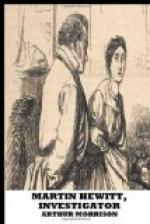On an investigation by London detectives, however, a feature of singularity was brought to light. There had plainly been only one thief at work at Radcot Hall, and no other had been inside the grounds. Alone he had planted the wires, opened the window, screwed the door, and picked the lock of the safe. Clearly this was a thief of the most accomplished description.
Some few days passed, and, although the police had made various arrests, they appeared to be all mistakes, and the suspected persons were released one after another. I was talking of the robbery with Hewitt at lunch, and asked him if he had received any commission to hunt for the missing jewels.
“No,” Hewitt replied, “I haven’t been commissioned. They are offering an immense reward however—a very pleasant sum, indeed. I have had a short note from Radcot Hall informing me of the amount, and that’s all. Probably they fancy that I may take the case up as a speculation, but that is a great mistake. I’m not a beginner, and I must be commissioned in a regular manner, hit or miss, if I am to deal with the case. I’ve quite enough commissions going now, and no time to waste hunting for a problematical reward.”
But we were nearer a clue to the Quinton jewels than we then supposed.
We talked of other things, and presently rose and left the restaurant, strolling quietly toward home. Some little distance from the Strand, and near our own door, we passed an excited Irishman—without doubt an Irishman by appearance and talk—who was pouring a torrent of angry complaints in the ears of a policeman. The policeman obviously thought little of the man’s grievances, and with an amused smile appeared to be advising him to go home quietly and think no more about it. We passed on and mounted our stairs. Something interesting in our conversation made me stop for a little while at Hewitt’s office door on my way up, and, while I stood there, the Irishman we had seen in the street mounted the stairs. He was a poorly dressed but sturdy-looking fellow, apparently a laborer, in a badly-worn best suit of clothes. His agitation still held him, and without a pause he immediately burst out:
“Which of ye jintlemen will be Misther Hewitt, sor?”
“This is Mr. Hewitt,” I said. “Do you want him?”
“It’s protecshin I want, sor—protecshin! I spake to the polis, an’ they laff at me, begob. Foive days have I lived in London, an’ ‘tis nothin’ but battle, murdher, an’ suddhen death for me here all day an’ ivery day! An’ the polis say I’m dhrunk!”




